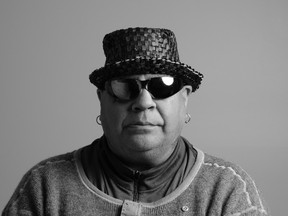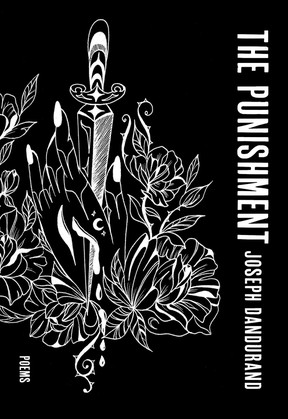Kwantlen First Nation poet Joseph Dandurand is haunted by his, and his people’s, past

Reviews and recommendations are unbiased and products are independently selected. Postmedia may earn an affiliate commission from purchases made through links on this page.
The Punishment
Joseph Dandurand | Nightwood Editions
Start your day with a roundup of B.C.-focused news and opinion delivered straight to your inbox at 7 a.m., Monday to Friday.
Thanks for signing up!
A welcome email is on its way. If you don't see it, please check your junk folder.
The next issue of Sunrise presented by Vancouver Sun will soon be in your inbox.
$21.95, 143pp

Across the 70-plus poems of The Punishment, Kwantlen First Nation resident Joseph Dandurand roves over a wide, thematic terrain. Foremost, though, there’s history — personal, familial, communal. Dandurand writes, “the past is all we have”; and for “survivors of hate” who “drink the poison” of that colonial past, it’s a painful, deeply troubling legacy that seeps into everyday experience.
“The Last Century” is a characteristic piece in that it portrays an elder poet recalling an adolescence that’s vivid in its immediacy: “We would smoke hash and weed, we took acid / snorted speed, we washed it down / with a mickey of rye. / I was only fifteen …” In another, Dandurand recalls, “In high school, I was / a bum a thief a lover a liar.” He joined a gang: “We fought the east side and fought / the north side — it was glorious.” Still elsewhere, the speaker confides, “the first cold touch of a priest destroyed me / into the man I am today.”
Dandurand’s persona — variously, the “old poet from upriver,” a writer who “has filled a room / full of unwanted poems,” and a “man of words” who writes “bad poems to recall the pain in me” — seems helpless before the scenes he revisits. They haunt him.
“I Am Punished …” begins with a list: “for being a liar and a cheat and a man / who cared only for himself.” “I was too busy” he recalls, “Sucking the tar / from the tinfoil and smoking the rock / that gave me the want to want more.”
In “Violence,” the speaker ponders “the loneliness of / being alone and not liked in school, / how the daily fights to survive it / waned on me as my hands hardened / from all the beatings.” (And, of being strapped: “The sister who gave it to me whispered / a prayer under her breath as she almost / climaxed with her duty to rid me of sin.”)
The poet’s mother appears, too, victimized and yet an emblem of endurance. She is the focus of the collection’s final poem, a “great woman” with a “mind soiled by disease.”
Her youth was disfigured by “the old school” she “went to / where she was abused / and used and tossed away / she did not conform to / the world they said was better.” That lovely, harrowing poem, “The Cheerfulness of Nothing Else,” closes with a refrain: “She is my mother / and she is my mother.”
Dandurand often refers to his mother and others of her generation, “still here among us, little and broken / They have scars of a time when hitting was the thing to do.” Other figures emerge as well, whether shadows who “drive needles into their arms,” city-dwellers who “sit in the park and share a pipe / nothing holy or sacred no it was a pipe of glass,” or “a drunk man curled up at the door / of the old church.” In the poet’s actuality the “drugged dance of addiction” is never far from sight.
The furious title poem offers a searing portrait of a girl, “now … one of our elders,” who “no longer wept. / She became tough, lost her Indian, / was saved by Christ”: “They took my mom at age five, / put her on a train to St Mary’s, / named after a biblical working girl, / one of the missing and murdered / of the time then and of the time now.” Following that, a prose-poem about school titled “It was Impossible to Forgive Them” opens with “They were lined up and asked who had pissed their beds.”
For Dandurand (The East Side of It All), writing offers an outlet, a means to focus thoughts, and to mull over a communal past and document it. “I was in school after kicking / drugs and booze and I was awake / so I took a writing course / and my mind exploded / with tales of woe,” he writes.
Elsewhere, occasional images — of love, of ritual, and of nature (water, fish, birds, rain) — provide hopeful counterbalance to an unflinching self-portrait, one that underscores “the pain and anguish of a man / who lived on the streets / who drank many a bottle / who loved and lost / who spent many a day in madhouses / and the quiet white rooms of many a hospital.”
-

Book review: B.C. historian revisits violent, murderous colonialism here at home
-

Chief Robert Joseph says in new book reconciliation is about all people coming together
-

Book review: 500 Years of Indigenous Resistance is a comic book with a serious message
-

Book review: Singer Christa Couture’s memoir a tale of loss, survival and transcendence
More news, fewer ads, faster load time: Get unlimited, ad-lite access to the Vancouver Sun, the Province, National Post and 13 other Canadian news sites for just $14/month or $140/year. Subscribe now through the Vancouver Sun or The Province.


